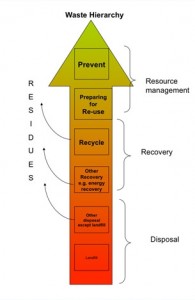NWRWMG consulted and then prepared a Waste Management Plan with the overall aim of developing a waste management system that meets the region’s needs and contributes to economic and social development.
Such a regional approach to waste management practices has mutual benefits, including increased opportunity with respect to meeting obligations, through economies of scale, and sharing of resources and targets.
Aims
The NWRWMG aims to provide community and civic leadership in the provision of improved waste management services through:
- providing leadership to assist in meeting statutory obligations
- promoting public awareness through consultation and participation
- seeking to minimise environmental impact
- seeking to maximise economic benefit at acceptable costs
- building on existing resources and services
- a co-ordinated approach to decision making based on data and feedback
Objectives
 The objectives and targets of the NI Waste Management Strategy can be represented in the Waste Management Hierarchy, as illustrated in the diagram. The hierarchy highlights the need to move practices away from landfill disposal and to promote prevention, preparing for reuse, recycling, other recovery and disposal.
The objectives and targets of the NI Waste Management Strategy can be represented in the Waste Management Hierarchy, as illustrated in the diagram. The hierarchy highlights the need to move practices away from landfill disposal and to promote prevention, preparing for reuse, recycling, other recovery and disposal.
- Prevention
- Preparing for Reuse
- Recycling
- Other Recovery
- Disposal
Fundamental to achieving these policy objectives are recognition and acceptance by all sections of society, as producers of waste, of their responsibility to support and adopt more sustainable waste management practices, both at home and at work. It is implicit therefore that the perception of waste as an unwanted but necessary by-product will need to change, with recognition of its potential as a resource.

